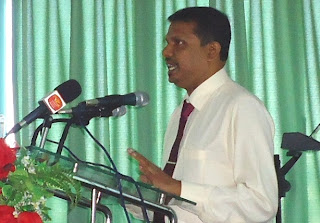Sri Lanka Medical Association
Southern Regional Conference - 23 & 24 February 2012
Light House Hotel, Galle
in Collaboration with the
Galle Medical Association
Symposium on Health Challenges in THE SOUTH – The Way Forward
Chairpersons:
Prof. Vajira H. W. Dissanayake (President, Sri Lanka Medical Association)
Dr. Kapila Jayarathne (Assistant Secretary, Sri Lanka Medical Association)
The symposium was conducted in two sessions. The initial session to sensitize and collate issues was held on 23rd February with the participation of relevant stakeholders from the Southern Province.
Prof Vajira W Dissanayake (President – SLMA) and Dr. Vajira Lekamwasam (President – GMA) co-chaired the workshop. Dr. Kapila Jayaratne (Assistant Secretary – SLMA) organized and moderated the workshop.
Prof Dissanayake while welcoming the participants outlined the importance of conducting symposiums of this nature to improve the service delivery in periphery and appreciated contribution of all the participants.
Dr. Kapila Jayaratne, presented background health indicators of Southern Province in relation to national statistics. He outlined the objectives of the workshop;
1. To sensitize policy makers and healthcare administrators on the issues faced by healthcare workers in Southern Province
2. To negotiate for feasible solutions to improve the healthcare service delivery in Southern Province
Following healthcare professionals from different fields presented challenges they encounter in healthcare service delivery in the Southern Province;
· Health Challenges in Galle District
- Dr. Vajira Lekamwasam (President – GMA)
· Health Challenges in Matara District
- Dr. R.M.U.K. Rathnayake (Regional Epidemiologist – Matara)
· Challenges faced by the Private Sector in the Southern Province
-Dr. Aruna Rabel, Director – Medical Services, Hemas Hospitals
· Challenges in Undergraduate & Postgraduate Medical Education in the Southern Province -Prof P L Ariyananda, Senior Professor of Medicine, University of Ruhuna
The session to negotiate for solutions was held on 24th February with the participation of Hon. Maithripala Sirisena, Minister of Health, as the Chief Guest, ministry officials, politicians, healthcare administrators of southern province, medical professionals, public health workers and medical students.
Prof. Vajira H. W. Dissanayake, welcomed the Hon Minister and participants. He thanked Hon Minister for his contribution in addressing issues in the health sector in the Southern Province.
Dr. Kapila Jayaratne compiled and presented major issues identified at the workshop conducted previous day. Dr. Palitha Maheepala (Additional Secreatry – MS) facilitated the negotiation process for finding solutions.
Taking leadership – Making a difference
Dr. Kapila Jayaratne
Assistant Secretary, SLMA
The success story of National Schoolbag Campaign was described as a person-driven initiative to make a difference in the community by a medical professional. Four million school children would benefit as a result of introduction of an ergonomically designed healthy schoolbag.



































